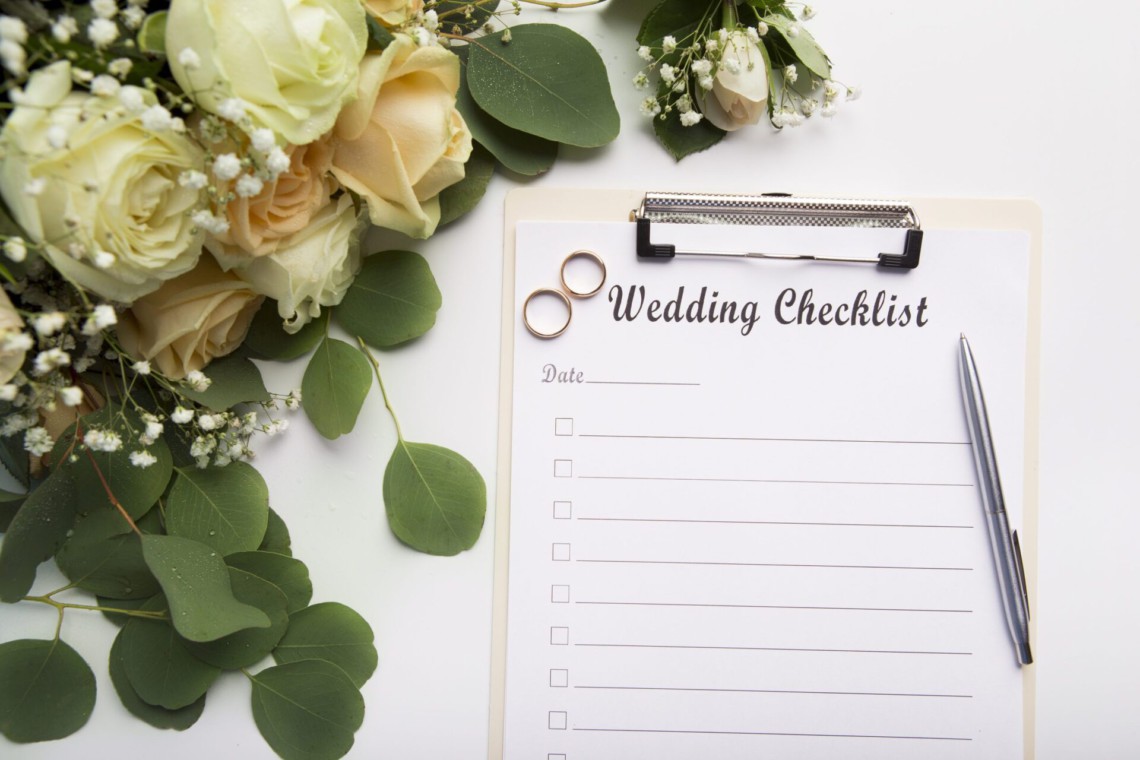Planning a wedding is an exhilarating journey filled with excitement, love, and a touch of stress. Whether you’re envisioning an intimate ceremony or a grand celebration, creating a comprehensive wedding checklist is paramount to ensuring your special day unfolds seamlessly. In this guide, we’ll walk you through every step of the process, from initial planning to the big day, and discuss the invaluable role of a wedding planner in orchestrating your dream wedding.
The Wedding Planning Timeline
12-18 Months Before the Wedding:
- Set a Date: Choose a date that works for you and your partner, considering factors like season, venue availability, and personal preferences.
- Establish a Budget: Determine your budget early on to guide your spending decisions throughout the planning process.
- Create a Guest List: Draft a preliminary guest list to estimate the size of your wedding and select a venue accordingly.
- Select a Venue: Research and visit potential venues that align with your vision and budget. Don’t forget to inquire about availability and reserve your date as soon as possible.
- Hire Vendors: Start booking essential vendors such as caterers, photographers, and musicians. Review portfolios, obtain quotes, and secure contracts to lock in your preferred vendors.
6-12 Months Before the Wedding:
- Choose Your Wedding Party: Invite friends and family members to be part of your wedding party and assign roles accordingly.
- Design Your Theme: Decide on a theme or style for your wedding, including color schemes, decor elements, and overall ambiance.
- Order Attire: Begin shopping for wedding attire for you, your partner, and the wedding party. Allow ample time for fittings and alterations.
- Send Save-the-Dates: Notify your guests of your wedding date by sending save-the-date cards or electronic invitations.
3-6 Months Before the Wedding:
- Finalize Details: Confirm arrangements with vendors, including menus, timelines, and logistical details.
- Plan Ceremony and Reception: Outline the flow of your ceremony and reception, including seating arrangements, music selections, and any special rituals or traditions.
- Obtain Marriage License: Research the requirements for obtaining a marriage license in your area and ensure all necessary paperwork is in order.
- Arrange Accommodations: Reserve accommodations for out-of-town guests and finalize your own wedding night accommodations.
1-3 Months Before the Wedding:
- Attend to Logistics: Tie up loose ends, such as arranging transportation, obtaining permits, and confirming delivery schedules.
- Finalize Details: Review all contracts and details with vendors to ensure everyone is on the same page.
- Create a Timeline: Develop a detailed timeline for your wedding day, including hair and makeup appointments, photo sessions, and ceremony/reception schedules.
- Confirm RSVPs: Follow up with guests who have not yet RSVP’d and provide final numbers to your vendors.
1 Week Before the Wedding:
- Pack and Prepare: Gather all necessary items for the wedding day, including attire, accessories, and any decor or personal touches.
- Rehearse: Hold a rehearsal with your wedding party and officiant to ensure everyone knows their roles and the ceremony flows smoothly.
- Delegate Responsibilities: Assign tasks to trusted friends or family members to help manage last-minute details and logistics.
- Relax and Enjoy: Take time to relax and pamper yourself in the days leading up to your wedding. Trust that you’ve done everything you can to prepare, and focus on savoring the moment.
The Role of a Wedding Planner
While planning wedding can be a rewarding experience, it can also be overwhelming, particularly for couples with busy schedules or limited experience in event coordination. This is where a wedding planner can be a lifesaver. A professional wedding planner brings expertise, industry connections, and invaluable support to help couples navigate every aspect of the planning process.
Benefits of Hiring a Wedding Planner:
- Expert Guidance: Wedding planners have extensive experience in the industry and can offer expert advice on everything from vendor selection to budget management.
- Time and Stress Management: By delegating tasks to a wedding planner, couples can alleviate stress and free up time to focus on other priorities.
- Vendor Relationships: Wedding planners often have established relationships with reputable vendors, allowing them to negotiate contracts and secure the best deals on behalf of their clients.
- Creative Vision: Wedding planners can help couples articulate their vision for the wedding and bring it to life through creative design concepts and innovative ideas.
- Day-of Coordination: On the wedding day, a wedding planner ensures that everything runs smoothly, from coordinating vendor arrivals to troubleshooting any last-minute issues, allowing the couple to relax and enjoy their special day.
Conclusion
Planning a wedding is a monumental undertaking, but with careful planning and the support of a trusted wedding planner, it can also be an incredibly rewarding and joyful experience. By following a best wedding checklist and enlisting the expertise of a professional planner, couples can ensure that their wedding day is everything they’ve dreamed of and more. So, take a deep breath, enjoy the journey, and get ready to say “I do” to a lifetime of love and happiness.
